Ras Al Khaimah
Ras Al Khaimah (RAK) (Arabic: رَأْس ٱلْخَيْمَة, historically Julfar) is the largest city and capital of the Emirate of Ras Al Khaimah, United Arab Emirates. It is the sixth-largest city in UAE after Dubai, Abu Dhabi, Sharjah, Al Ain and Ajman. The city is divided by a creek into two parts: old town in the west and Al Nakheel in the east.[2]
Ras Al Khaimah
رَأْس ٱلْخَيْمَة | |
|---|---|
City | |
| Ras Al Khaimah | |
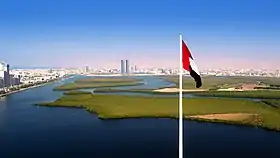  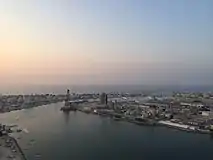 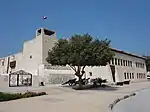 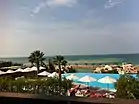 Clockwise from top: Mangroves are seen from Al Qawasim corniche flagpole, Ras Al Khaimah creek, Rotana resort in Ras Al Khaimah, Ras Al Khaimah fort museum, Sheikh Zayed Mosque in Ras Al Khaimah | |
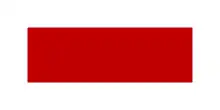 Flag 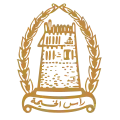 Coat of arms | |
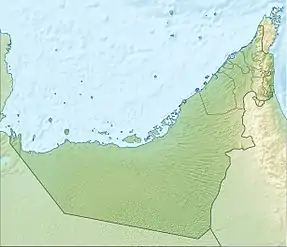 Ras Al Khaimah Location of RAK City within UAE  Ras Al Khaimah Ras Al Khaimah (Persian Gulf) | |
| Coordinates: 25°46′N 55°57′E | |
| Country | United Arab Emirates |
| Emirate | Ras Al Khaimah |
| Government | |
| • Type | Municipality |
| • Sheikh | Saud bin Saqr Al Qasimi |
| Area | |
| • Total | 373 km2 (144 sq mi) |
| Elevation | 40 m (130 ft) |
| Population (2022)[1] | |
| • Total | 191,753 |
| • Density | 510/km2 (1,300/sq mi) |
| Time zone | UTC+4 (UAE Standard Time) |
| Website | RAK.ae |
Etymology
The name Ras Al Khaimah means "the headland of the tent".[3] It is reported that the city gained its named after a tent was erected there to facilitate navigation.[4]
History

The northern area of the city today known as Ras Al Khaimah was previously the location of the important Islamic era settlement and port of Julfar.[5] Ras Al Khaimah has been the site of continuous human habitation for 7,000 years, one of the few places in the country and the world where this is the case.[6]
Archaeological evidence has demonstrated that the settlement known as Julfar shifted location over time as harbour channels silted up. Excavations of a sizable tell, which revealed remnants of a Sassanid era fortification, indicate that early Julfar was located in the north of the present city of Ras Al Khaimah, not far from other sites of historical and archaeological interest such as the Pre-Islamic fort, 'Sheba's Palace' (Shimal Fort).
One of Ras Al Khaimah's most celebrated sons, Ibn Majid, was a hugely influential seaman, navigator and cartographer,[7][8] and there is evidence in his writing that the town he came from was at that time known as Ras Al Khaimah,[3] that town having eclipsed Julfar as the principal port and settlement of the Shimal coast.
In the early 18th century, the Qawasim (singular Al Qasimi) established themselves in Ras Al Khaimah and Sharjah on the Arabian Peninsula, growing to become a significant maritime force with holdings on both the Persian and Arabian coasts that frequently came into conflict with British flagged shipping.[9]
In the aftermath of a series of attacks against shipping sailing under Omani flags and following 1809 monsoon season, the British mounted the Persian Gulf campaign of 1809 against Ras Al Khaimah, in which the Al Qasimi fleet was largely destroyed. The British operation continued to Lingeh on the Persian coast which was, like the Greater and Lesser Tunbs islands, administered by the Al Qasimi.[9][10]
By the morning of 14 November, the military expedition was over and the British forces returned to their ships, having suffered light casualties of five killed and 34 wounded. Arab losses are unknown, but were probably significant, while the damage done to the Al Qasimi fleets was severe: a significant portion of their vessels had been destroyed.[11]
Following the 1809 campaign, an 1815 arrangement was made between the British and the Al Qasimi.[12] However, by 1819 it was clear the arrangement had broken down and so in November of that year, the British embarked on a second expedition against the Al Qasimi at Ras Al Khaimah, led by Major-General William Keir Grant.[13]
The force gathered off the coast of Ras Al Khaimah on 25 and 26 November and, on 2 and 3 December, troops were landed south of the town and set up batteries of guns and mortars and, on 5 December, the town was bombarded from both land and sea for a period of four days, until, on 9 December, the fortress and town of Ras Al Khaimah were stormed and found to be practically deserted. On the fall of Ras Al Khaimah, three cruisers were sent to blockade Rams to the North and this, too was found to be deserted and its inhabitants retired to the 'impregnable' hill-top fort of Dhayah.[14]
The British landed a force at Rams on 18 December, which fought its way inland through date plantations to Dhayah Fort on the 19th. There, 398 men and another 400 women and children held out, without sanitation, water or effective cover from the sun, for three days under heavy fire from mortars and 12-pound cannon.[15]
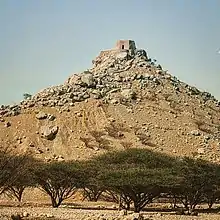
The two 24-pound cannon from HMS Liverpool which had been used to bombard Ras Al Khaimah from the landward side were once again pressed into use and dragged across the plain from Rams, a journey of some four miles. Each of the guns weighed over 2 tonnes. After enduring two hours of sustained fire from the big guns, which breached the fort's walls, the last of the Al Qasimi surrendered at 10.30 on the morning of 22 December.[15]
In January 1820, the British imposed the General Maritime Treaty of 1820 signed by Sheikh Sultan Bin Saqr Al Qasimi of Sharjah who was reinstated by the British in Ras Al Khaimah after the deposition of Hassan bin Rahma Al Qasimi.[16] The treaty stipulated the end of piracy and slavery, and laid the foundation for the British protectorate over the Trucial States that lasted until December 1971.
A British protectorate from this point forward, as one of the Trucial States, in 1869, Ras Al Khaimah became fully independent from neighbouring Sharjah. From September 1900 to 7 July 1921, it was re-incorporated into Sharjah; the last governor became its next independent ruler.[17]
The last of the Trucial States to join the newly independent United Arab Emirates, on 10 February 1972, Ras Al Khaimah, under the leadership of Sheikh Saqr bin Mohammad Al Qasimi, joined the United Arab Emirates following the Iranian seizure of Abu Musa and the Greater and Lesser Tunbs.[18]
Population
The population of the city is around 115,949 (2021), and it is the largest city in the Emirate of Ras Al Khaimah.[19] It is the 6th most populous city in the UAE.
Areas
- Sidroh
- Al Rams
- Khuzam
- Digdaga
- Al Seih
- Al Dhait North
- Al Dhait South
- Al Mamourah
- Al Nakheel
- Al Qurm
- Al Qusaidat
Education
Other than Arabic government-funded schools, the city is home to Ras Al Khaimah Academy,Wellspring School, and other Indian schools.[20] Higher education institutions in the city include the Higher Colleges of Technology, Ras Al Khaimah Medical and Health Sciences University, American University of Ras Al Khaimah[21] and many other colleges.
Transportation
Ras Al Khaimah International Airport serves the Emirate of Ras Al Khaimah.
Economy
The city of Ras Al Khaimah is home to the Ras Al Khaimah Economic Zone (RAKEZ) that helps connect investors and international markets. It operates an online client portal called Portal 360.[22] The zone services businesses ranging from freelancers to SMEs and start-ups across 50 industries. RAKEZ is divided into six dedicated zones:[23][24]
- Al Ghail Industrial Zone
- Al Hamra Industrial Zone
- RAKEZ Academic Zone
- Al Hulaila Industrial Zone
- Al Nakheel Business Zone
- Al Hamra Business Zone
Ceramics industry
The city is the headquarters of RAK Ceramics, a global ceramics manufacturer. The company produces 123 million square meters of tiles and 5 million pieces of sanitaryware every year.[25] It employs 12,000 employees and is listed on the Abu Dhabi Securities Exchange in the United Arab Emirates and on the Dhaka Stock Exchange in Bangladesh.[26] Its annual turnover is estimated at $1 billion.[27][28]
Pharmaceutical industry
Gulf Pharmaceutical Industries is a pharmaceutical manufacturer operating in the MENA region and headquartered in the city of Ras Al Khaimah.[29] The company, also known under the name of Julphar, employs 5,000 people and distributes its products to 50 countries.[30] It divides its activities between three units: Julphar Diabetes Solutions, General Medicines and Julphar Life. The company became a producer of raw ingredients for insulin in 2012.[31][32]
Sports
The city is home to football teams Emirates Club and Ras Al Khaimah Club, which have both competed in the UAE Top Division.
References
- "Population of Ras Al Khaimah 2022-2023".
- "Ras Al Khaimah - The Official Portal of the UAE Government". u.ae. Archived from the original on 2022-03-18. Retrieved 2021-07-07.
- Hawley, Donald (1970). The Trucial States. London: Allen & Unwin. p. 88. ISBN 0-04-953005-4. OCLC 152680. Archived from the original on 2020-08-03. Retrieved 2023-02-20.
- "Ras al-Khaimah | Emirate, History, & Facts". Encyclopedia Britannica. Archived from the original on 2021-06-29. Retrieved 2021-07-07.
- Leech, Nick (2015-10-22). "The long read: has a lost Arab capital been found on the Oman-UAE border?". The National. Archived from the original on 2017-05-31. Retrieved 2019-01-20.
- "History & Culture". Visit Ras Al Khaimah. Archived from the original on 2020-08-09. Retrieved 2020-08-01.
- Zacharias, Anna (2012-11-24). "'Lion of the Sea' - 500 years ago may be the new face of tourism". The National. Abu Dhabi. Archived from the original on 2018-07-06. Retrieved 2020-03-21.
Ahmed bin Majid was a navigator, poet and scholar of such respect that he is known among mariners as "the Lion of the Sea" more than five centuries after his death.
- Lunde, Paul (2005-08-01). "The Navigator: Ahmad Ibn Majid". Aramco World. Vol. 56, no. 4. Houston, Texas. pp. 45–48. Archived from the original on 2015-12-22. Retrieved 2020-03-21.
- al-Qāsimī, ibn Muḥammad (1986). The myth of Arab piracy in the Gulf. London: Croom Helm. ISBN 0709921063. OCLC 12583612.
- Lorimer, John (1915). Gazetteer of the Persian Gulf. British Government, Bombay. pp. 653–674.
- Marshall, John (1823). "Samuel Leslie Esq.". Royal Naval Biography. Longman, Rees, Orme, Brown & Green. pp. 88–90. Archived from the original on 2023-02-19. Retrieved 2023-02-20.
- "Gazetteer of the Persian Gulf. Vol I. Historical. Part IA & IB. J G Lorimer. 1915' [653] (796/1782)". qdl.qa. Archived from the original on 26 June 2019. Retrieved 13 January 2014. This article incorporates text from this source, which is in the public domain.
- Moorehead, John (1977). In Defiance of The Elements: A Personal View of Qatar. Quartet Books. p. 23. ISBN 9780704321496.
- Lorimer, John (1915). Gazetteer of the Persian Gulf. British Government, Bombay. pp. 666–670.
- Lorimer, John (1915). Gazetteer of the Persian Gulf. British Government, Bombay. p. 668.
- Commins, David (2012-03-15). The Gulf States: A Modern History - David Commins - ßĘČ Google. ISBN 978-1848852785. Archived from the original on 2023-02-19. Retrieved 2013-09-15.
- Said Zahlan, Rosemarie (2016). The Origins of the United Arab Emirates : a Political and Social History of the Trucial States. Taylor and Francis. p. 51. ISBN 9781317244653. OCLC 945874284.
- Kourosh Ahmadi, Islands and International Politics in the Persian Gulf: The Abu Musa and Tunbs in Strategic Context (Routledge, 2008) p96
- "Population of Cities in United Arab Emirates". worldpopulationreview.com. Archived from the original on 2020-04-13. Retrieved 2020-05-25.
- "Best schools in RAK". Edarabia.com. Archived from the original on 11 November 2020. Retrieved 2 September 2019.
- "American University of Ras Al Khaimah - (AURAK)". American University of Ras Al Khaimah UAE. 2016-08-05. Archived from the original on 2020-05-25. Retrieved 2020-05-25.
- Nagarajan, Nisthula. "One-stop for aspiring business owners". Khaleej Times. Archived from the original on 2021-07-09. Retrieved 2021-07-07.
- "Ras Al Khaimah Economic Zone (RAKEZ) | Free Trade Zone in RAK, UAE – Best Free Zone". rakez.com. Archived from the original on 2021-06-13. Retrieved 2021-07-07.
- Nagraj, Aarti (2020-01-26). "How to set up a company in Ras Al Khaimah Economic Zone (RAKEZ)". Gulf Business. Archived from the original on 2021-07-09. Retrieved 2021-07-07.
- "Made in the UAE: 9 companies that make medicines, perfumes, aircraft parts and much more". gulfnews.com. Archived from the original on 2021-07-08. Retrieved 2021-07-08.
- "More big companies coming to stock market: BSEC chief". The Financial Express. Archived from the original on 2021-05-18. Retrieved 2021-07-08.
- "Company". RAK Ceramics. Archived from the original on 2021-07-09. Retrieved 2021-07-08.
- "RAK Ceramics announces FY 2018 financial results". www.zawya.com. Archived from the original on 2021-07-11. Retrieved 2021-07-08.
- "Ras Al Khaimah - The Official Portal of the UAE Government". u.ae. Archived from the original on 2022-03-18. Retrieved 2021-07-10.
- "Valeritas Signs Exclusive Middle East Distribution Agreement with Julphar". AP NEWS. 2018-11-13. Archived from the original on 2021-07-10. Retrieved 2021-07-10.
- "10 things that are made in the UAE, from perfume to plane parts". The National. Archived from the original on 2021-07-10. Retrieved 2021-07-10.
- Nagraj, Aarti (2012-08-07). "Julphar Signs Insulin Deal With US-Based Firm". Gulf Business. Archived from the original on 2021-07-10. Retrieved 2021-07-10.
External links
 Media related to Ras Al Khaimah (city) at Wikimedia Commons
Media related to Ras Al Khaimah (city) at Wikimedia Commons